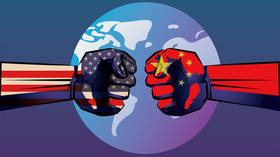US-China rift threatens global growth – IMF

Intensifying geopolitical tensions could disrupt overseas investment and eventually lead to a protracted loss of 2% of the world’s gross domestic product, the International Monetary Fund (IMF) has warned.
According to the organization’s economic outlook on Wednesday, fragmentation risks are rising globally as companies and policymakers are oriented towards moving production home or to “trusted countries.”
Growing trade tensions between investing and recipient countries like the United States and China have reduced the overall bilateral cross-border allocation of portfolio investment and bank claims by around 15%, the IMF said.
“Over the last decade, the share of FDI (foreign direct investment) flows among geopolitically aligned economies has kept rising, more than the share for countries that are closer geographically, suggesting that geopolitical preferences increasingly drive the geographic footprint of FDI,” the report noted.
The rise of “friendshoring” could hurt less-developed markets the most, the organization suggested.
“Emerging markets and developing economies are particularly affected by reduced access to investment from advanced economies, due to reduced capital formation and productivity gains from the transfer of better technologies and know-how,” it said.
IMF economists cautioned that “a fragmented world is likely to be a poorer one.”
While reconfigured supply chains could potentially strengthen national security and help maintain a technological advantage over geopolitical rivals, “reshoring or friendshoring to existing partners will often reduce diversification” and make countries more vulnerable to macroeconomic shocks, the report said.
“In a fragmented world with heightened geopolitical tensions, investors may worry that nonaligned economies will be forced to choose one bloc or the other in the future, and such uncertainty could intensify losses,” the IMF concluded.
For more stories on economy & finance visit RT's business section













